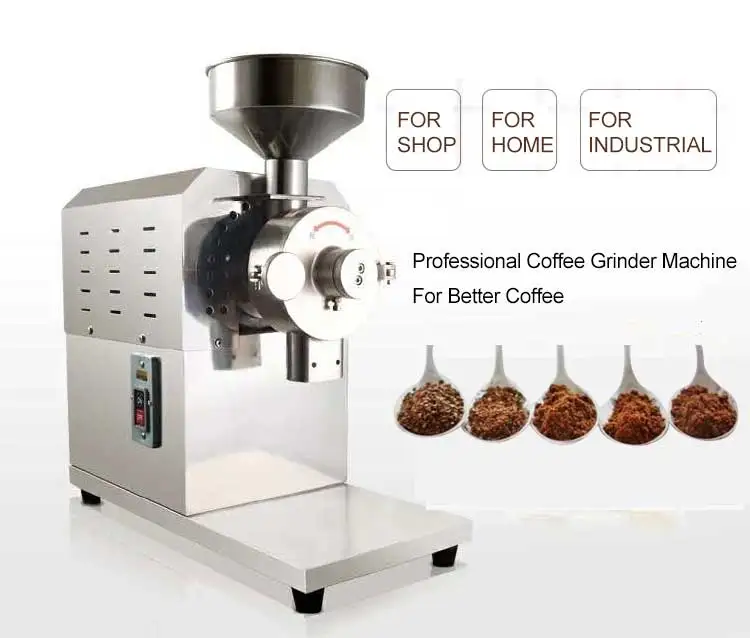Industrial Coffee Grinder: Selecting the Best Model for Your Business
Industrial Coffee Grinder: Selecting the Best Model for Your Business
Blog Article
Industrial Coffee Mill Overview: Boost Efficiency and High Quality
In the competitive landscape of coffee manufacturing, picking the right industrial coffee mill plays an essential role in enhancing both effectiveness and product top quality. Comprehending the subtleties of numerous grinder types and vital attributes-- such as customizable work setups and robust construction-- can considerably affect the last flavor profile of the coffee. Additionally, the optimization of the grinding process, combined with thorough upkeep, is necessary for maintaining performance over time. As we discover these essential aspects, it becomes obvious that the implications prolong past simple devices selection, influencing general organization success in methods that necessitate closer assessment.
Understanding Grinder Types
When selecting an industrial coffee mill, comprehending the numerous kinds offered is crucial for maximizing both flavor removal and operational efficiency. Both key types of grinders are blade grinders and burr grinders. Blade mills use sharp blades that chop coffee beans into irregular sizes, resulting in uneven removal and potentially unfavorable flavors. While blade grinders are typically a lot more inexpensive and suitable for small-scale operations, they are usually not advised for commercial use.

Inevitably, picking the appropriate kind of grinder is integral to preserving high quality and efficiency in coffee production, making it essential for companies to buy high-grade burr grinders for ideal outcomes.
Trick Attributes to Consider
Selecting an industrial coffee grinder requires mindful factor to consider of numerous vital attributes that can significantly affect both efficiency and the general coffee experience. Among the primary facets to assess is the grinding system. Burr mills are typically liked over blade mills, as they supply a regular grind dimension, which is crucial for ideal extraction and taste.
One more crucial attribute is the mill's capability. A versatile grinder with numerous settings allows you to tailor the grind dimension to different developing methods, improving the coffee's flavor profile.
Review the mill's sound degree, especially in a busy café or production atmosphere, where too much noise can be disruptive. Investing in a grinder that balances these attributes can greatly boost both functional effectiveness and the high quality of the coffee offered.
Optimizing Grinding Refine
To accomplish the very best results in coffee prep work, maximizing the grinding procedure is necessary. The work size dramatically influences removal, flavor, and total quality of the made coffee. Different developing approaches require particular work sizes; as an example, coffee demands a fine work, while French press demands a coarse appearance. Comprehending the partnership between work dimension and brewing method is the first step in optimization.


Furthermore, keeping track of the grinding rate can optimize the process. Slower grinding typically generates less heat, preserving delicate flavors and official source scents. Alternatively, quicker grinding might produce extreme warmth, negatively affecting the coffee's high quality.
Maintenance and Care Tips
Correct upkeep and care of industrial coffee grinders are important for ensuring optimal efficiency and long life. Regular cleansing is the foundation of upkeep; deposit build-up can impact taste and grinding effectiveness. It is a good idea to cleanse the grinder after each usage, cleaning down the outside and getting rid of any type of coffee grounds from the burrs.
Additionally, inspect the grinding burrs for damage. Boring burrs can endanger grind uniformity, so they must be click for source replaced as essential. Industrial Coffee Grinder. Regularly adjusting the grinder is also critical, as this maintains the preferred work dimension for various brewing approaches
Lubrication of relocating components need to be carried out according to the supplier's specs, as this decreases rubbing and lengthens the life of the tools. It is vital to use food-grade lubricants to make certain security and compliance with health and wellness guidelines.
Last but not least, maintain the mill in a stable and dry setting to stop rust and deterioration. By adhering to these upkeep and care pointers, operators can boost the efficiency of their industrial coffee grinders while ensuring top notch outcome and extended functional life.
Roi Evaluation
Evaluating the return on investment (ROI) for industrial coffee mills is important for businesses looking for to maximize their coffee manufacturing abilities. An extensive ROI evaluation aids determine the financial practicality of buying high-grade mills, enabling services to evaluate the preliminary costs against potential gains.
Assess the purchase price of the mill, consisting of installation and any kind of necessary adjustments to existing framework. High-performance grinders usually lead to reduced grinding time and increased throughput, which can substantially improve efficiency.
Furthermore, consider the influence go to these guys on item quality. Industrial Coffee Grinder. Superior mills generate a more consistent work size, which can improve flavor profiles and consumer contentment, eventually driving sales. By enhancing the high quality of the end product, businesses can validate greater pricing, resulting in enhanced profits
Final Thought
In recap, a commercial coffee grinder plays a critical role in boosting both effectiveness and item quality within coffee manufacturing. Inevitably, the critical investment in a reliable grinder contributes considerably to enhanced revenue and competition in the coffee sector.
In the affordable landscape of coffee manufacturing, picking the best commercial coffee grinder plays a crucial role in improving both efficiency and item quality. The 2 key kinds of mills are blade grinders and burr grinders. Within the burr grinder classification, there are level burr grinders and conelike burr mills, each with its advantages. Burr grinders are normally liked over blade grinders, as they supply a consistent grind dimension, which is critical for ideal extraction and taste.
In summary, a commercial coffee grinder plays a pivotal duty in boosting both performance and product quality within coffee manufacturing.
Report this page